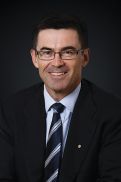

John Wylie AM
CHAIR
AUSTRALIAN SPORTS COMMISSION
Australia has always had grand sporting aspirations, at the elite level and by involving and inspiring the next generation through their school and community environments. Our goal is to be the most active sporting nation, known for its integrity, thriving sports organisations, exceptional international successes and world-leading sports industry.
We have a sweeping vision for the future and a clear focus on the present, following another outstanding year of results at home and abroad. Our efforts as a system have targeted delivering on Australia’s high performance strategy.
For women, there has never been a better time to be playing a team sport in Australia.
The rewards are greater, and long overdue. From netball’s ground-breaking new national league, to cricket’s historic pay deal, to AFL Women’s spectacular debut season, football’s soaring Matildas and beyond, our women are breaking new ground.
Individuals, too, continue to shine. Tyler Wright won her first world surfing championship in October, and despite missing the chance to defend her 100-metre hurdles 2012 Olympic Gold Medal at the Rio 2016 Games, hurdler Sally Pearson completed a remarkable comeback from injury at the world athletics championships in July, 2017.
It was in Rio that Australia finished 10th on the Olympic medal table, and fifth at the Paralympics. While proud of those efforts, and all who helped to achieve them, we continue to aim higher.
One exceptional Olympic performance among many was 18-year-old Kyle Chalmers’ in becoming the first Australian since 1968 to claim the 100-metre freestyle gold.
Closer to home, A-League champions Sydney FC completed one of the greatest domestic seasons in any sport, finishing with the highest number of points (66) and wins (20) in A-League history.
Yet no team can afford to stand still — including ours. We welcome the Federal Government’s $15.5 million commitment in the 2017–18 budget to maintain high performance funding and support Australia’s athletes leading into the 2018 Commonwealth Games, as well as the development of a National Sport Plan (NSP). The Australian public has been canvassed for its opinion about priorities in the sport sector, along with other key stakeholders. The NSP will supply a long-term strategy for Australian sport, improving participation and performance and ensuring people remain physically and mentally healthy.
As well as preparing the NSP with the Minister for Health and Minister for Sport, The Hon. Greg Hunt MP, and his office, the Commission is committed to: steering sport in a bold new direction and showing strong leadership; driving participation and physical activity; connecting the sector digitally; strengthening workforce capability and; partnering with organisations that can strengthen sport and connect with communities. The AIS will strengthen its capability in athlete care, data intelligence, research and innovation and in developing people in our system.
Through the growth of our Sporting Schools program, we continue to emphasise the importance of the school environment, and will roll out our blueprint for physical literacy in the year ahead.
The first results from AusPlay have now been revealed. This is an important new tool to capture insights into participation trends and assist sports with strategies to grow their numbers. This data is also delivered to State Governments to aid their decision making.
Two major international events feature in early 2018: the XXIII Olympic Winter Games and Paralympics in PyeongChang, South Korea, and the Gold Coast Commonwealth Games.
Performance-wise, the Commonwealth Games is one of Australia’s key benchmark events; participation-wise, it will involve more than 6,600 athletes and team officials from 70 nations and territories. Good luck and best wishes to all involved.
There are many who make significant contributions to Australian sport. Together with my Board, I would like to acknowledge Mr Hunt for his active involvement and ongoing commitment through the establishment of the NSP.
We thank the ASC stakeholders and partners who contribute to the success and sustainability of sport, including national sporting organisations (NSOs), the Australian Olympic Committee (AOC), the Australian Paralympic Committee (APC), Commonwealth Games Australia (CGA), state institutes and academies of sport (SIS/SAS), state departments of sport and recreation (SDSR), sponsors and business partners, coaches, support staff and families.
We also thank former CEO Simon Hollingsworth and AIS Director Matthew Favier for five years of exceptional leadership and service in those two key roles. Meanwhile, the vision and drive of new CEO Kate Palmer are already apparent as she oversees a major organisational restructure and leads the next exciting stage of the Commission’s evolution. I would also like to acknowledge the appointment of Alisa Camplin-Warner as Deputy Chair of the ASC. With her strong business acumen and high performance knowledge, Alisa will continue to help shape the direction of sport in Australia. As Chair, it is a privilege to be reappointed to the role and serve the Australian community and Australian sport.
To our staff and our Board members, your contributions may sometimes go unheralded, but they are never unappreciated. Australian sport is stronger and healthier for them.
John Wylie AM
Chair
Australian Sports Commission